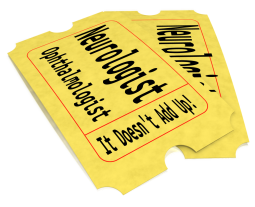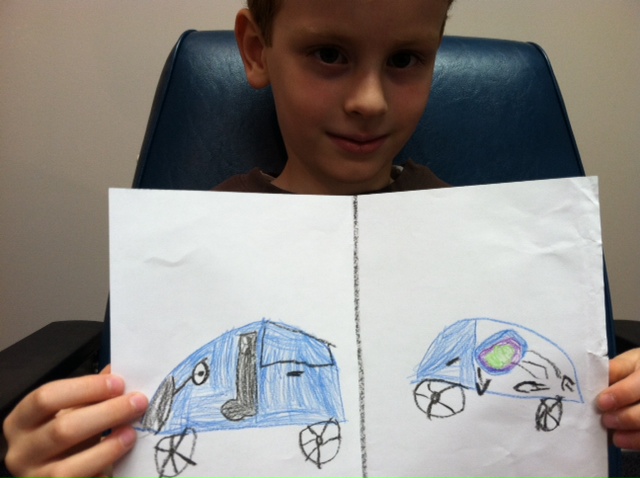Father Knows Best was a highly popular TV show starring Robert Young in the 1950s. Much has changed since then.
For starters, you won’t see the star of a series lighting up a cigarette. We know enough about the health risks of smoking that the idea of a cigarette company sponsoring a wholesome family TV show is long gone, and rightfully so. Even the name of the series sounds odd, as we acknowledge that in many areas of family life, Mother Knows Best. Such is the case in an episode I’d like to share with you from our office.
Angel, also known as “AJ” (Angel Julio – per his mother the lightest skinned Cuban you’ll ever meet) is a high verbal, exceedingly bright almost 7 year-old who wants to become a scientist doing animal research. His mother accompanied him during the diagnostic testing in our office that preceded my chairside exam. She related that she had a strong sense of finally being in the right place, and her comments were so heartfelt that I pulled out my iPhone and did a quick, one take video with her.
Here’s a picture that AJ drew of the type of visual disturbance that he was experiencing that precipitated the neurologist having him undergo an EEG.
 As AJ’s mom was going through his history with me, I was struck by how often mothers know best. She related that she had seen the pediatric neurologist multiple times, but that what he was telling her about AJ’s reported vision problems wasn’t relevant to his school problems. In kindergarten he was keeping pace with reading very well, and his oral vocabulary was off the charts. The neurologist diagnosed AJ with ADHD so that mom could get the ticket for Section 504 accommodations. His mother knew, from what she read on the visionhelp website, that this diagnosis didn’t really add up. In his differential diagnosis the neurologist entertained occipital lobe seizures (unlikely considering AJ had a normal EEG), migraines, floaters, and macular or central retinal defects.
As AJ’s mom was going through his history with me, I was struck by how often mothers know best. She related that she had seen the pediatric neurologist multiple times, but that what he was telling her about AJ’s reported vision problems wasn’t relevant to his school problems. In kindergarten he was keeping pace with reading very well, and his oral vocabulary was off the charts. The neurologist diagnosed AJ with ADHD so that mom could get the ticket for Section 504 accommodations. His mother knew, from what she read on the visionhelp website, that this diagnosis didn’t really add up. In his differential diagnosis the neurologist entertained occipital lobe seizures (unlikely considering AJ had a normal EEG), migraines, floaters, and macular or central retinal defects.
AJ’s mother gave me a copy of the neurologist’s short report indicating a diagnosis of “Visual Feld Defects” based on AJ’s verbal report and drawing one month after the diagnosis of ADHD. The neurologist advised AJ’s mother to obtain an ophthalmology evaluation, but mom knew that this evaluation was essentially another ticket she needed to navigate the system and wasn’t likely to give her information relevant to AJ’s difficulty with reading. I dilated AJ’s pupils, and he has neither vitreous abnormalities nor retinal defects. Entoptic phenomena of the type he’s reporting come and go with children, and a VEP may be more relevant here than the EEG. I’ll write up his case another day, but suffice it to say at this point that mother’s intuition was spot on.
 Ideally AJ would have been evaluated by a pediatric neurologist like Mark Mintz, M.D., founder of The Center for Neurological and Neurodevelopmental Health. Dr. Mintz is well acquainted with Developmental Optometry, and he now has a branch of CNNH in Northern New Jersey. At present, he is co-investigator of a research project funded by COVD on Convergence Insufficiency and its Relationship to ADHD, along with Drs. Eric Borsting, Michael Gallaway, Mitchell Scheiman, and Barry Tannen.
Ideally AJ would have been evaluated by a pediatric neurologist like Mark Mintz, M.D., founder of The Center for Neurological and Neurodevelopmental Health. Dr. Mintz is well acquainted with Developmental Optometry, and he now has a branch of CNNH in Northern New Jersey. At present, he is co-investigator of a research project funded by COVD on Convergence Insufficiency and its Relationship to ADHD, along with Drs. Eric Borsting, Michael Gallaway, Mitchell Scheiman, and Barry Tannen.
At the conclusion of my evaluation AJ got out of the exam chair, and gave me a big, unsolicited hug. Something tells me his intuition is pretty good too.

Dr. Press,
I’m sure you hear it often, but maybe not often enough about how other Developmental OD’s appreciate your articles and voice for a segment of healthcare that really understands their patients and have therapeutic solutions which have long-term and meaningfully practical impact on our patient’s primary learning issues. I appreciate particularly your being tapped-in to other health care disciplines and your spin on how they relate to the care Developmental Optometrists provide.
Thanks again,
Harry Landrum
Thanks for the kind words, Dr. Landrum. It’s always gratifying to hear that the information is informative and useful. Thanks so much for reading and taking the time to comment!